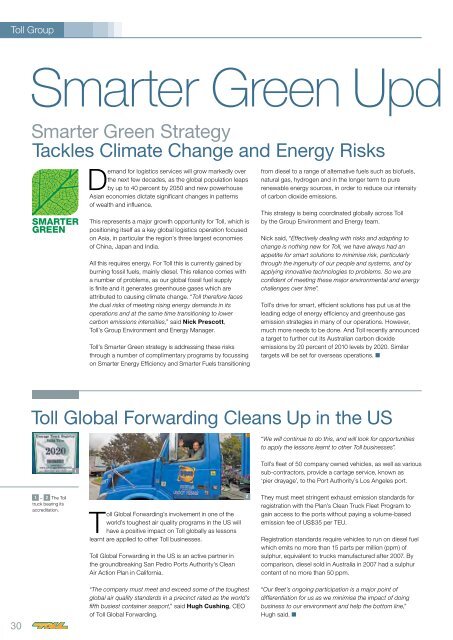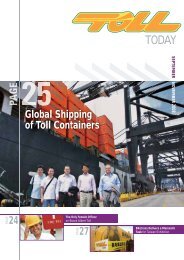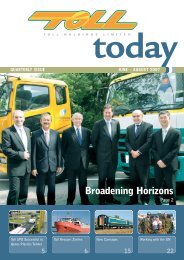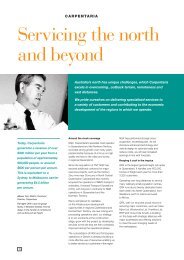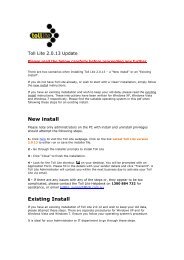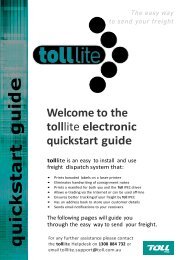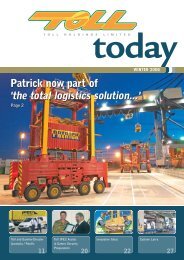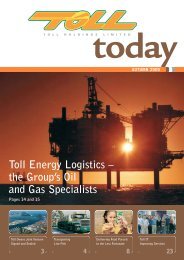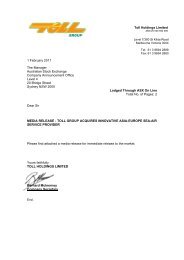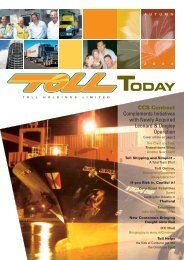Create successful ePaper yourself
Turn your PDF publications into a flip-book with our unique Google optimized e-Paper software.
<strong>Toll</strong> <strong>Group</strong><br />
30<br />
Smarter Green Upd<br />
Smarter Green Strategy<br />
Tackles Climate Change and Energy risks<br />
Demand for logistics services will grow markedly over<br />
the next few decades, as the global population leaps<br />
by up to 40 percent by 2050 and new powerhouse<br />
Asian economies dictate significant changes in patterns<br />
of wealth and influence.<br />
This represents a major growth opportunity for <strong>Toll</strong>, which is<br />
positioning itself as a key global logistics operation focused<br />
on Asia, in particular the region’s three largest economies<br />
of China, Japan and India.<br />
All this requires energy. For <strong>Toll</strong> this is currently gained by<br />
burning fossil fuels, mainly diesel. This reliance comes with<br />
a number of problems, as our global fossil fuel supply<br />
is finite and it generates greenhouse gases which are<br />
attributed to causing climate change. “<strong>Toll</strong> therefore faces<br />
the dual risks of meeting rising energy demands in its<br />
operations and at the same time transitioning to lower<br />
carbon emissions intensities,” said nick Prescott,<br />
<strong>Toll</strong>’s <strong>Group</strong> Environment and Energy Manager.<br />
<strong>Toll</strong>’s Smarter Green strategy is addressing these risks<br />
through a number of complimentary programs by focussing<br />
on Smarter Energy Efficiency and Smarter Fuels transitioning<br />
<strong>Toll</strong> Global Forwarding’s involvement in one of the<br />
world’s toughest air quality programs in the US will<br />
have a positive impact on <strong>Toll</strong> globally as lessons<br />
learnt are applied to other <strong>Toll</strong> businesses.<br />
<strong>Toll</strong> Global Forwarding in the US is an active partner in<br />
the groundbreaking San Pedro Ports Authority’s Clean<br />
Air Action Plan in California.<br />
“The company must meet and exceed some of the toughest<br />
global air quality standards in a precinct rated as the world’s<br />
fifth busiest container seaport,” said Hugh Cushing, CEO<br />
of <strong>Toll</strong> Global Forwarding.<br />
from diesel to a range of alternative fuels such as biofuels,<br />
natural gas, hydrogen and in the longer term to pure<br />
renewable energy sources, in order to reduce our intensity<br />
of carbon dioxide emissions.<br />
This strategy is being coordinated globally across <strong>Toll</strong><br />
by the <strong>Group</strong> Environment and Energy team.<br />
Nick said, “Effectively dealing with risks and adapting to<br />
change is nothing new for <strong>Toll</strong>, we have always had an<br />
appetite for smart solutions to minimise risk, particularly<br />
through the ingenuity of our people and systems, and by<br />
applying innovative technologies to problems. So we are<br />
confident of meeting these major environmental and energy<br />
challenges over time”.<br />
<strong>Toll</strong>’s drive for smart, efficient solutions has put us at the<br />
leading edge of energy efficiency and greenhouse gas<br />
emission strategies in many of our operations. However,<br />
much more needs to be done. And <strong>Toll</strong> recently announced<br />
a target to further cut its Australian carbon dioxide<br />
emissions by 20 percent of 2010 levels by 2020. Similar<br />
targets will be set for overseas operations. n<br />
<strong>Toll</strong> Global Forwarding Cleans up in the uS<br />
1 – 2 The <strong>Toll</strong><br />
truck bearing its<br />
accreditation.<br />
1<br />
2<br />
“We will continue to do this, and will look for opportunities<br />
to apply the lessons learnt to other <strong>Toll</strong> businesses”.<br />
<strong>Toll</strong>’s fleet of 50 company owned vehicles, as well as various<br />
sub-contractors, provide a cartage service, known as<br />
‘pier drayage’, to the Port Authority’s Los Angeles port.<br />
They must meet stringent exhaust emission standards for<br />
registration with the Plan’s Clean Truck Fleet Program to<br />
gain access to the ports without paying a volume-based<br />
emission fee of US$35 per TEU.<br />
Registration standards require vehicles to run on diesel fuel<br />
which emits no more than 15 parts per million (ppm) of<br />
sulphur, equivalent to trucks manufactured after 2007. By<br />
comparison, diesel sold in Australia in 2007 had a sulphur<br />
content of no more than 50 ppm.<br />
“Our fleet’s ongoing participation is a major point of<br />
differentiation for us as we minimise the impact of doing<br />
business to our environment and help the bottom line,”<br />
Hugh said. n


